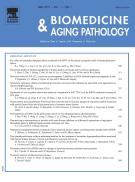Ameliorative effects quercetin against impaired motor nerve function, inflammatory mediators and apoptosis in neonatal streptozotocin-induced diabetic neuropathy in rats - 20/12/12

Graphical abstract |
Abstract |
In developing as well as developed countries, diabetes mellitus is one of the major problems. Oxidative stress plays a vital role in generation and maintenance of the diabetic neuropathy. The aim of present investigation was to study the effect of quercetin (10, 20 and 40mg/kg; p.o.) in n-STZ-induced diabetic neuropathy in rats. Streptozotocin (90mg/kg i.p.) was administered to rat pups of age 2days (10–12g), resultedin significant decrease in mechanical and thermal hyperalgesia, mechanical allodynia, motor and sensory nerve conduction velocity as well as superoxide dismutase, glutathione peroxidase along with membrane bound inorganic phosphate which was confirmed after 6weeks of induction of diabetes. It caused enhanced hyperlipidemia, blood glucose level, glycated hemoglobin, oxidative-nitrosative stress, total calcium levels, inflammatory mediators (TNF-⍺ and IL-1β levels) along with DNA damage. The 8-week treatment of quercetin (10, 20 and 40mg/kg; p.o.) started 6weeks after diabetes induction significantly improved nerve functions, biochemical as well as molecular parameters and DNA damage in sciatic nerve evidence in histological findings that were associated with n-STZ-induced diabetic neuropathic pain. Results of the present investigation suggest the neuroprotective effect of quercetin may be mediated through the inhibition of hyperglycemia and modulation of oxidative-nitrosative stress, pro-inflammatory cytokine (TNF-⍺ and IL-1β) as well as DNA damage.
El texto completo de este artículo está disponible en PDF.Keywords : DNA fragmentation, Interleukin-1β, Motor nerve conduction velocity, Na-K-ATPase, Nitric oxide, n-STZ diabetic neuropathy, Oxidative stress, Quercetin, Sensory nerve conduction velocity, Tumor necrosis factor ⍺
Esquema
Vol 2 - N° 4
P. 173-186 - octobre 2012 Regresar al númeroBienvenido a EM-consulte, la referencia de los profesionales de la salud.
El acceso al texto completo de este artículo requiere una suscripción.
¿Ya suscrito a @@106933@@ revista ?

